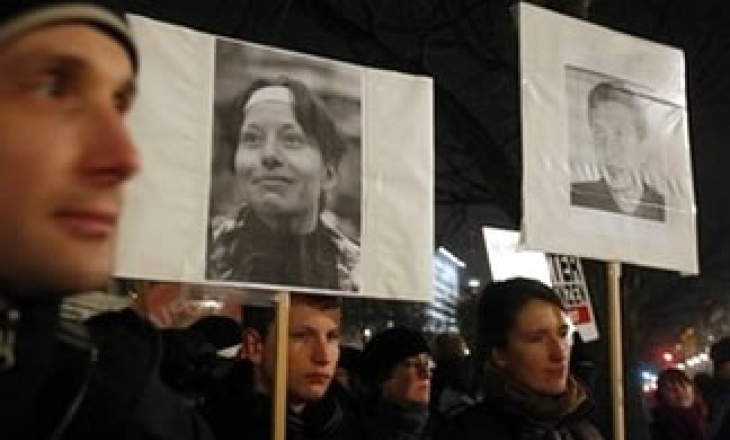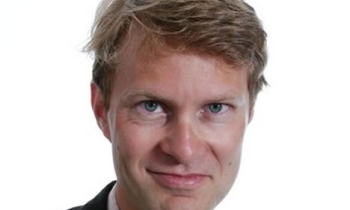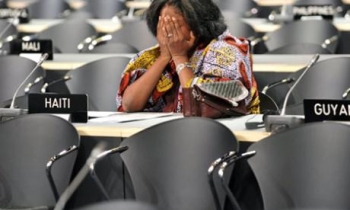The shocking murders of lawyer Stanislav Markelov and young journalist Anastasia Barburova on Monday brings Russia's human rights record to a new low, press freedom groups have said.
The crime is compounded by the knowledge that Russia has a culture where impunity reigns and murderers are rarely brought to justice, ARTICLE 19 and Index on Censorship have said. Even in the case of a journalist as famous as Anna Politkovskaya, after a rare two-year murder investigation it is the alleged accomplices who are on trial—while the murderer remains at large, they said.
Markelov was well known for his work as a human rights lawyer, particularly in Chechnya. Markelov represented the family of 18-year-old Kheda Kungayeva, who was murdered by Yuri Budanov—the first senior officer to be convicted of human rights abuse during the Chechen campaigns. Markelov had announced that he would be challenging Budanov's early release last week.
Those who are brave enough to expose human rights abuses in Russia risk their lives, ARTICLE 19 / Index on Censorship said. Over the past few months, victims have included Umar Israilov, a Chechen who claimed that he had been tortured by President Ramzan Kadyrov and had filed a complaint to the European Court of Human Rights. He was shot dead in Vienna last week.
Last November, Mikhail Beketov, a local newspaper editor, was assaulted in the Moscow suburb of Khimki and left in a coma. Beketov had been a fearless critic of the local administration. Last summer, Magomed Yevloyev, who owned the website www.ingushetia.ru and also bravely exposed abuses, was shot dead in a police car as he was being taken away for questioning.
"All these cases represent a striking and widespread level of lawlessness. We would like to remind the Russian authorities that as a State Party to the European Convention on Human Rights, Russia has agreed to secure the human rights of all within its jurisdiction, including the right to life and to freedom of expression," they said.
"We are shocked by these brutal killings and call on Russian authorities to swiftly, thoroughly, and effectively investigate the crime and bring all perpetrators to justice," said Committee to Protect Journalists (CPJ) Europe and Central Asia Programme Coordinator Nina Ognianova. "In broad daylight, on a busy Moscow street, in the presence of witnesses, a killer gunned down a lawyer and a journalist in a cold-blooded assassination typical of those that occur in Russia's present-day climate of impunity."
ARTICLE 19, English PEN and Index on Censorship called on Russian authorities to do everything in their power to bring those responsible for the murders of Markelov and Barburova to justice—and to demonstrate the will to address the continuing culture of impunity.
Baburova was a student at the Journalism Faculty of Moscow State University and had worked at Novaya Gazeta part-time since October, investigating the activities of neo-Nazi groups in Russia and covering race-motivated crimes, which have been on the rise in Moscow in recent years, Sergei Sokolov, deputy editor of Novaya Gazeta, told CPJ.
Baburova is the fourth Novaya Gazeta journalist killed since 2000, according to CPJ. Domnikov, 42, a reporter and special-projects editor for the paper, was struck repeatedly on the head with a heavy object outside his apartment building on May 12, 2000. He died on July 16 of that year, after spending two months in a coma. Yuri Shchekochikhin, 53, Novaya's then-deputy editor, was abruptly killed in a matter of days by a rare allergy in July 2003. His colleagues say they are convinced he was poisoned to prevent him from uncovering high-level corruption involving officials from the Federal Security Service and the prosecutor general's office. Anna Politkovskaya, 48, renowned worldwide for her critical coverage of the Chechen conflict, was slain in her apartment building in Moscow in October 2006.
Russia is the third-deadliest country in the world for journalists, according to CPJ research. Since 2000 alone, 16 journalists have been murdered in Russia in direct retaliation for their work; only in one of these cases--Domnikov's--have the killers been convicted. In all 16 cases, however, the masterminds remain at large.










